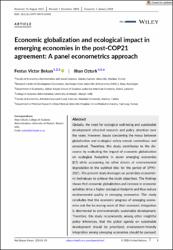Economic globalization and ecological impact in emerging economies in the post-COP21 agreement: A panel econometrics approach
Özet
Globally, the need for ecological well-being and sustainable
development attracted research and policy attention over
the years. However, issues concerning the nexus between
globalization and ecological safety remain contentious and
unresolved. Therefore, this study contributes to the discourse by evaluating the impact of economic globalization
on ecological footprints in seven emerging economies
(E7) while accounting for other drivers of environmental
degradation in the outlined bloc for the period of 1990–
2021. The present study leverages on panel data econometric techniques to achieve the study objectives. The findings
shows that economic globalization and increase in economic
activities drive a higher ecological footprint and thus reduce
environmental quality in emerging economies. This study
concludes that the economic progress of emerging economies and the increasing wave of their economic integration
is detrimental to environmentally sustainable development.
Therefore, this study recommends, among other insightful
policy inferences, that the global agenda on sustainable
development should be prioritized, environment-friendly
integration among emerging economies should be pursued. Environmental regulations should be strictly observed by
the countries in their bid for economic development and
integration.

















